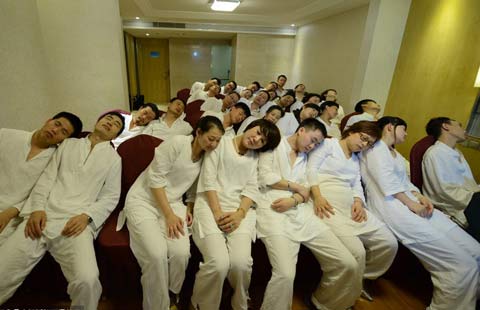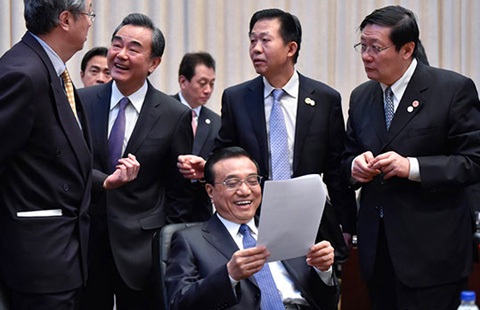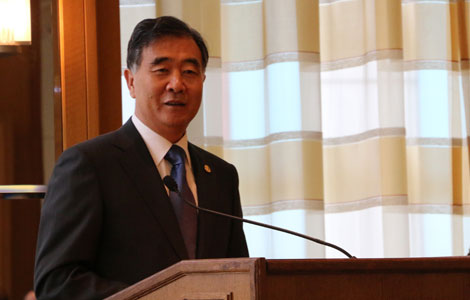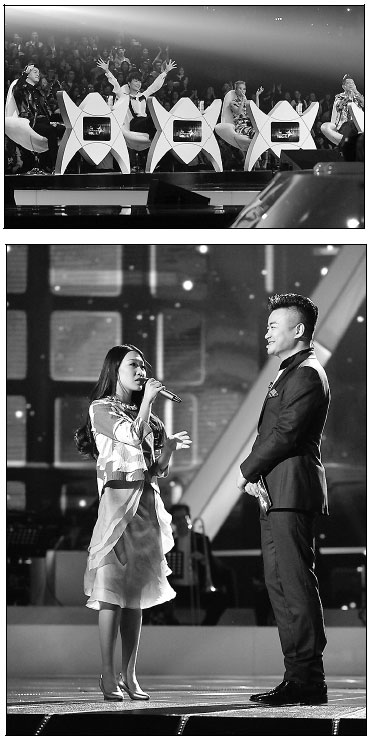The battle for young viewers
Updated: 2014-12-18 08:03
By Han Bingbin(China Daily USA)
|
|||||||||
CCTV is embracing Internet culture and working with independent producers on TV shows to woo audiences under 35. Han Bingbin reports.
After charming audiences with his warm smile for 14 years, China Central Television host Li Jiaming recently found himself targeted by a group of young netizens unhappy with his style.
The complaints came after Li hosted the premiere of Rising Star on Oct 31. It is a singing competition show that originated in Israel. Many young netizens found his hosting style slow and boring and mocked it as "CCTV evening gala style". They even initiated an online campaign to replace him.
|
Performers sing on CCTV's singing competition show Rising Star. CCTV is relying on such entertaining programs to win more young viewers. Photos Provided to China Daily |
The 40-year-old host's reaction to the criticism was surprising. During the second episode, he jokingly called himself "the slow Jiaming" and acted much younger, talking faster and louder.
"It's like selling a product. When the customers file a complaint, you must change," says Li. "In the Internet age, you get feedback very quickly. These young people are so cute. When you're willing to change for them, they will quickly like you back."
In order to win more young viewers, CCTV is relying on programs such as Rising Star to embrace Internet culture. In Rising Star, a studio audience and fans watching on television vote for their favorite singers in real time, using the instant-messaging app WeChat.
Rising Star was designed to be a live broadcast, but the Chinese version isn't because of policy reasons. Still, WeChat votes by viewers at home are still a major factor in determining which contestants advance to the next round. In the show's latest episode, more than 6.5 million votes were cast via WeChat.
"Now the competition among entertainment shows is very fierce. Audiences have more diverse needs. CCTV needs to embrace an open attitude, interact with young audiences and blend with the Internet," says Lyu Yitao, director of CCTV's entertainment channel.
The producer of Rising Star, Enlight Media, says the program will have "a phenomenal effect" given CCTV's audience base nationwide.
"But it comes with a challenge," says Zhang Hang, chief producer of the program and CEO of Enlight Media's TV business.
Unlike top-ranking provincial satellite channels such as Hunan TV, which have a large base of young fans thanks to a series of phenomenally popular entertainment and reality shows, CCTV productions are usually more conservative and serious, and thus have a much older audience base.
"If we were to run this program on Hunan, we may attract twice as many viewers," says Zhang. "But since we didn't make it there, we now have to make the best out of the given conditions. And it means we have to make certain compromises."
When the current season of Rising Star ends, Zhang says his company will conduct an overall evaluation of the program and make adjustments for future seasons. Although audience ratings haven't lived up to Zhang's expectations, he says the program has already helped CCTV attract more young people. According to Enlight Media, the number of people ages 15 to 35 who watched the first episode of Rising Star was 76 percent higher than the usual audience for CCTV entertainment productions.
In order to attract young audiences, CCTV has been working with independent production companies. As one of CCTV's closest partners, Enlight Media has produced several entertainment and reality shows for the company's channels, including the Chinese version of The Biggest Loser on CCTV's business channel and an original teenager talent show Shaonian Zhongguo - qiang (Strong Young Chinese) on CCTV1.
This year CCTV also licensed EE-Media, the producer of the popular Super Girl talent shows, to produce the talk show Hi! 2014, hosted by Taiwan pop star Harlem Yu and one of China's most popular TV stars Xie Na. The show is geared toward younger audiences.
Canxing Productions, which rose to fame with the success of its Voice of China series on Zhejiang TV, also produced two talent shows for CCTV. One is an original production called Songs of China, which ended up as one of CCTV's most watched programs of 2014.
The State Administration of Press, Publication, Radio, Film and Television announced earlier this year that, starting in 2015, only one music talent show can be aired nationwide during prime time each season, and there can be only one program based on foreign formats each year.
However, domestic media report that such policies don't apply to CCTV, meaning it will become a highly desired platform by production companies.
Wang Changtian, CEO of Enlight Media, confirmed to the Shanghai Securities News that its programs scheduled to air on CCTV next year, which include at least two reality shows, won't be affected. A kung fu-themed reality show, produced by Canxing, is also reportedly scheduled to run on CCTV next year.
CCTV is "very active. The level of its acceptance of new ideas is even beyond my imagination," says Zhang Hang.
"Our cooperation with CCTV will surely continue."
Contact the writer at hanbingbin@chinadaily.com.cn
|
Judges (top) and Rising Star's host Li Jiaming (above, right). In the program, a studio audience and fans watching on television vote for their favorite singers in real time, using the instant-messaging app WeChat. |

(China Daily USA 12/18/2014 page9)

 China's 10 major economic policies in 2014
China's 10 major economic policies in 2014
 Beeper collector brings back the vintage digital age
Beeper collector brings back the vintage digital age
 10 bad behaviors of Chinese drivers
10 bad behaviors of Chinese drivers
 Yearender: Honors achieved in 2014
Yearender: Honors achieved in 2014
 Surprising techniques to relieve stress
Surprising techniques to relieve stress
 Yearend Review 2014 -Best of Animals
Yearend Review 2014 -Best of Animals
 Premier: In between the meetings
Premier: In between the meetings
 Chinese VP speaks at food cooperation forum in Chicago
Chinese VP speaks at food cooperation forum in Chicago
Most Viewed
Editor's Picks

|

|

|

|

|

|
Today's Top News
New dynamic as US, Cuba restore relations
China set to make tracks for Europe
US moves to normalize relations with Cuba
Russians flock to stores to pre-empt price rises
New York premiere of DPRK comedy canceled after threat
Wal-Mart bullish over Sam's Club
Beijing hotel recognized for excellence
Li makes pitch for business investment
US Weekly

|

|










